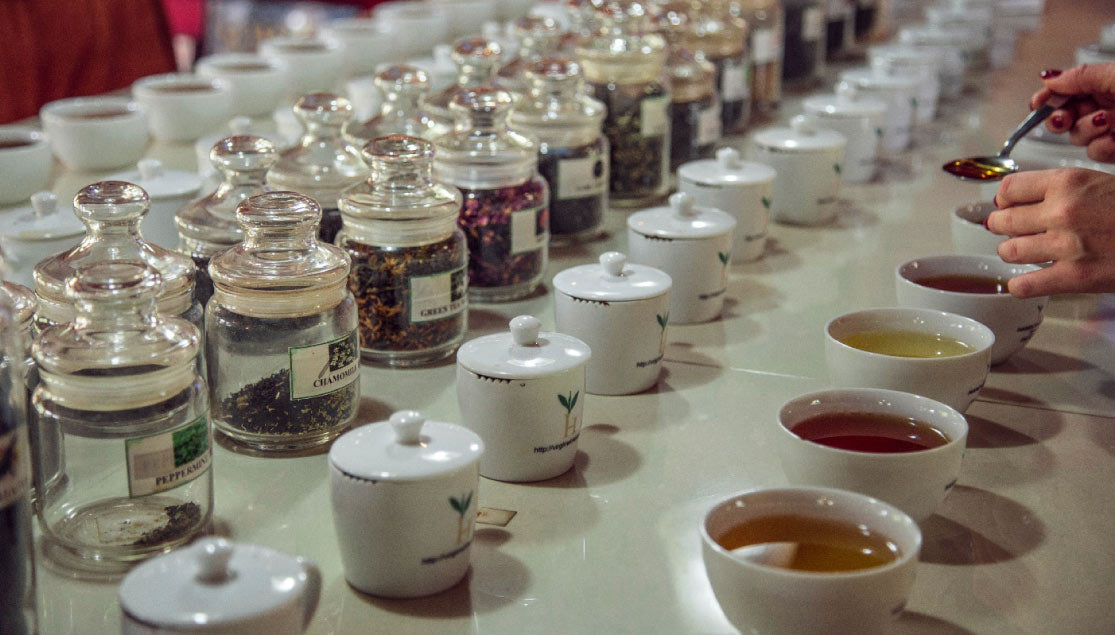Tea, with its diverse flavors and rich cultural heritage, has a history that spans centuries. From ancient China to colonial British tea parties, this beloved beverage has left an indelible mark on civilizations around the world. Join us as we delve into the captivating history and explore the vibrant cultures that have shaped tea traditions worldwide.
The Origins of Tea
The story of tea begins in ancient China, where it was discovered by Emperor Shen Nong over 5,000 years ago. Legend has it that tea leaves fell into his boiling water, creating a delightful infusion. From there, tea quickly gained popularity and became deeply ingrained in Chinese culture, leading to the development of various tea ceremonies and traditions.
A Glimpse into Tea Cultures from Different Regions
Japanese Tea Culture

In Japan, tea found a home in the refined and meditative practice of Chanoyu, also known as the Japanese tea ceremony. This meticulously choreographed ritual emphasizes harmony, respect, and tranquility. Matcha, a powdered green tea, takes center stage in this elegant tradition, where every movement and gesture holds deep symbolism.
Moroccan Mint Tea
In Morocco, tea is more than a beverage—it is a symbol of hospitality and friendship. Moroccan mint tea is a blend of green tea leaves, fresh mint, and sugar. The tea is poured from a height, creating a beautiful cascade, and is traditionally served in small glasses to guests as a gesture of warm welcome.
Indian Chai Tea
Chai tea holds a special place in Indian culture, where it is a staple in daily life. This spiced tea is made by simmering black tea leaves with a blend of aromatic spices, such as cardamom, cinnamon, ginger, and cloves. It is often brewed with milk and sweetened with sugar, creating a rich and comforting drink enjoyed by millions across the country.
Turkish Tea Rituals
In Turkey, tea has become an integral part of social gatherings and daily life. Turkish tea is traditionally brewed using a double teapot called a çaydanlık, with the strong tea concentrated in the smaller upper pot and diluted with hot water in the lower pot. Served in small, tulip-shaped glasses, Turkish tea is enjoyed with lively conversations and a sense of community.
British Afternoon Tea

Tea played a pivotal role in British history, particularly during the Victorian era. The tradition of afternoon tea emerged as a social ritual, offering an opportunity for friends and acquaintances to gather for tea, sandwiches, scones, and pastries. It became a symbol of refinement and etiquette, an integral part of British culture that endures to this day.
Future of Tea
The future of tea holds both exciting opportunities and potential challenges as consumer preferences, sustainability concerns, and technological advancements continue to shape the industry.
Innovation in Tea Products
As tea continues to gain popularity, we can expect to see innovative tea products and flavors emerge. This may include new blends, herbal infusions, functional teas, and unique flavor profiles that cater to evolving consumer preferences.
Rise of Specialty and Artisanal Tea
Similar to the specialty coffee movement, the specialty tea sector is also expected to grow. Consumers are increasingly seeking high-quality, artisanal teas with unique flavors and origins. This trend may lead to a greater emphasis on single-origin teas, rare tea varieties, and specialty tea experiences.
Sustainability and Ethical Sourcing
With increasing awareness of sustainability issues, consumers are becoming more conscious of the environmental and social impact of their choices. The tea industry is increasingly focusing more on sustainable and ethical sourcing practices, including fair trade, organic farming, and regenerative agriculture. This shift may involve greater transparency in supply chains and efforts to reduce carbon footprint.
Health and Wellness Trends
As people prioritize health and wellness, tea's reputation as a healthy beverage may continue to drive its popularity. Specific types of tea, such as green tea and herbal infusions, are associated with various health benefits. We may see an increased demand for teas with functional properties, adaptogens, and herbal blends designed to support specific wellness goals.
Tea, with its diverse origins and global traditions, has transcended borders and united cultures. From the tranquil Japanese tea ceremonies to the lively Turkish tea rituals, each tea tradition reflects the unique customs and values of its respective culture.
Whether you're sipping a delicate cup of Chinese green tea or enjoying a robust cup of Indian chai, take a moment to appreciate the history, artistry, and cultural significance that fills every sip. Let tea be your passport to a world of flavors and traditions, connecting you to the rich tapestry of global tea culture.
References:
- "The Story of Tea: A Cultural History and Drinking Guide" by Mary Lou Heiss and Robert J. Heiss.
- "Tea: History, Terroirs, Varieties" by Kevin Gascoyne, Francois Marchand, Jasmin Desharnais, and Hugo Americi.
- "For All the Tea in China: How England Stole the World's Favorite Drink and Changed History" by Sarah Rose.
- "Tea: The Drink That Changed the World" by Laura C. Martin.
- "The Tea Book" by Linda Gaylard.
- "Tea: A Miscellany Steeped with Trivia, History and Recipes" by Emily Kearns.
- "Tea: Addiction, Exploitation, and Empire" by Roy Moxham.





